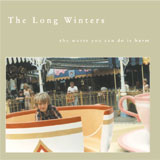
Artless in Seattle:
The Long Winters' Indie Sincerity
"I've lived an emotional life. People who have been close to me are not
untouched. I guess I would say that people should be wary about getting
close to me, and not because I'm violent or manipulative or perverse. They
should be careful because I'm an actual person and not just a persona. Are
people are dangerous." - John Roderick
John Roderick, indie hero and frontman of The Long Winters, is an actual
person. Unlike the persona-shifting products of some of today's big acts,
the band's debut album, the worst you can do is harm, sounds likes
ghosts
and pain and anger and rage and frustration and bitterness and regret - in
short, it sounds exactly the way a real person feels. It's like someone
reached into your head and found some of the hardest moments of your life
and then wrote a soundtrack. And yet, it's not mopey, woe-is-me,
slit-my-wrists-in-the-bathtub-mother moaning - it's sad like the way life
sucks sometimes, like the way shit is confusing, like love and tenderness
and beauty sometimes hurt. And yet it rocks: sometimes all the pain
clicks into goodness and bliss. You need this.
But first: a bit of advice. This album goes down well with a beer.
And second: some background nuggets. Roderick was once part of the
much-acclaimed and never-recorded Western State Hurricanes, a Seattle band
that "imploded." So then he went walking through Europe for five months
and grew a beard and thought about abandoning singing and songwriting.
But he came back, first joining the indie outfit Harvey Danger, and now
The Long Winters.
Roderick comes to us from Anchorage, Alaska.. One early inspiration was
hisolder sister, who left her Duran Duran cover band to go punk, inspiring
Roderick to write songs about how lame it was to be an Anchorage punker.
But somewhere along the way, he stopped writing just to impress his
sister's friends and tapped into a new vibe - a vibe of honesty and truth.
"I mean, on this record, I've admitted to being hurt by lovers, sometimes
unreachable, willful, self-destructive, dull, vindictive which every
honest person can identify with," he says. "I want people to feel like the
humiliations that drive them crazy and keep them up at night are not
unique. I want them to have music that doesn't just talk about getting
laid, but also about failing to get laid."
The liner notes to worst you can do reflect this newfound
sincerity.
Beyond the typical childhood pictures and artsy photographs, Roderick has
included intense letters from ex-lovers: "My heart aches to think of the
love you refused to give me," one reads. "If you want to drink yourself
into anonymity to fuck your way into soulless self importance, then you
don't need a friend, advisor, or buffer to hold your hand" reads another.
He also includes a forcibly-signed childhood vow to be "the student
and
not the entertainer." But the letters were no Eminem-style
exploitation
of personal relationships: Roderick got the women's permission to print
them - they're still friends. "Everyone can recognize the sentiments
expressed in them, and imagine somewhat of the feeling that they inspired.
At no point in the letters am I accused of any crime other than the
inexplicable failure to be the man they wanted," he adds.
The worst thing you can do is harm sounds like eels meets old 97s meets
R.E.M. with a side salad of Grant Lee Phillips. And a hearty portion of
irony, sarcasm, Southern Gothic and intelligence. With lyrics like,
"Making dinner dates? What, are you blind? I hold down two jobs just to
keep one from flying," Roderick takes the mundane and makes it sound
smarter. In "Medicine Cabinet Pirate," a song about "Miss Pinched Fingers
/ Stuffy Nose," Roderick spits out one of the most fantastic parting lines
I've ever heard: "your new math is treason." With track titles including
"Unsalted Butter" and "Government Loans," Roderick is really good with the
details. "You can tell a thousand things about a person from the way they
light their cigarettes," he comments. "So .. just show them lighting a
cigarette and get out of the way."
|
|



film politics music jay's head poetry art josh ring saddies about archive